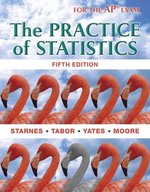Solution Found!
Benfords law Refer to Exercise 5. The first digit of a randomly chosen expense account
Chapter 6, Problem 7(choose chapter or problem)
Benfords law Refer to Exercise 5. The first digit of a randomly chosen expense account claim follows Benfords law. Consider the events A = first digit is 7 or greater and B = first digit is odd. (a) What outcomes make up the event A? What is P(A)? (b) What outcomes make up the event B? What is P(B)? (c) What outcomes make up the event A or B? What is P(A or B)? Why is this probability not equal to P(A) + P(B)?
Questions & Answers
QUESTION:
Benfords law Refer to Exercise 5. The first digit of a randomly chosen expense account claim follows Benfords law. Consider the events A = first digit is 7 or greater and B = first digit is odd. (a) What outcomes make up the event A? What is P(A)? (b) What outcomes make up the event B? What is P(B)? (c) What outcomes make up the event A or B? What is P(A or B)? Why is this probability not equal to P(A) + P(B)?
ANSWER:Step 1 of 5
Given,
The event first digit is 7 or greater = A
The event first digit is odd = B.
Using the probability distribution in Exercise 5 we can determine the following:
